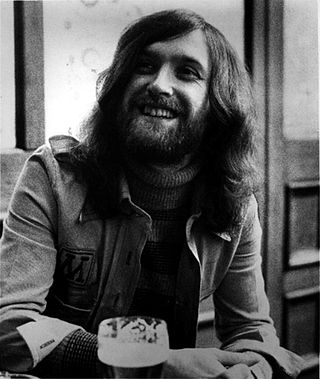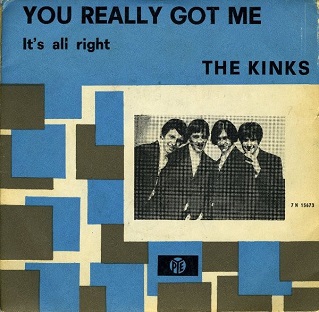
Sir Raymond Douglas Davies is an English musician. He was the lead vocalist, rhythm guitarist and primary songwriter for the rock band the Kinks, which he led with his younger brother Dave on lead guitar and backing vocals. He has also acted in, directed and produced shows for theatre and television. Known for focusing his lyrics on rock bands, English culture, nostalgia and social satire, he is often referred to as the "Godfather of Britpop", though he disputes this title. He was inducted into the Rock and Roll Hall of Fame as a member of the Kinks in 1990. After the dissolution of the Kinks in 1996, he embarked on a solo career.

David Russell Gordon Davies is an English guitarist, singer and songwriter. He was the lead guitarist and backing vocalist for the English rock band the Kinks, which also featured his older brother Ray. Davies also sometimes undertook writing and/or lead vocals duties within the band, for example on songs such as "Death of a Clown", "Party Line", "Strangers" and "Rats". He has also embarked on a solo career, releasing several singles during the late 1960s and has since released eight solo albums.

"You Really Got Me" is a song by English rock band the Kinks, written by frontman Ray Davies. The song, originally performed in a more blues-orientated style, was inspired by artists such as Lead Belly and Big Bill Broonzy. Two versions were recorded, with the second performance used for the final single. Lead guitarist Dave Davies performs the song’s famous guitar solo. Although it was long rumoured that future Led Zeppelin guitarist Jimmy Page had performed the song's guitar solo, this has been debunked by Page himself.

Muswell Hillbillies is the tenth studio album by the English rock group the Kinks. Released in November 1971, it was the band's first album for RCA Records. The album is named after the Muswell Hill area of North London, where band leader Ray Davies and guitarist Dave Davies grew up and the band formed in the early 1960s.

Lola Versus Powerman and the Moneygoround, Part One, commonly abbreviated to Lola Versus Powerman, or simply Lola, is the eighth studio album by the English rock band the Kinks, released on 27 November 1970. A concept album, it is a satirical appraisal of the music industry, including song publishers, unions, the press, accountants, business managers, and life on the road. It marked the group's expansion to a five-piece with the addition of keyboardist John Gosling.

The Kinks were an English rock band formed in London in 1963 by brothers Ray and Dave Davies. They are regarded as one of the most influential rock bands of the 1960s. The band emerged during the height of British rhythm and blues and Merseybeat, and were briefly part of the British Invasion of the United States until their touring ban in 1965. Their third single, the Ray Davies-penned "You Really Got Me", became an international hit, topping the charts in the United Kingdom and reaching the Top 10 in the United States.

"Shangri-La" is a song written by Ray Davies of the Kinks. The song appeared on the 1969 concept album, Arthur. The song's inspiration can be traced back to when the band visited the Davies brothers' sister, Rose, and her family in Australia, the "designed community" that the family lived in serving as the initial lyrical inspiration. The song's highly ironic lyrics comment on British class society while portraying Arthur, the album's ill-fated protagonist, and his empty life in the suburbs. The musical aspects of the song both reflect and comment on the mood of the lyrics.

"Celluloid Heroes" is a song performed by the Kinks and written by their lead vocalist and principal songwriter, Ray Davies. It debuted on their 1972 album Everybody's in Show-Biz.

Percy is a 1971 film soundtrack for the British comedy film Percy performed by the English rock group the Kinks with additional orchestral arrangements conducted by Stanley Myers. It was released as the band’s ninth official studio album. The songs were written by Ray Davies and include both standard rock/pop songs and instrumental numbers.
"Got to Be Free" is a song written by Ray Davies and performed by British rock band the Kinks. It was released on their 1970 LP Lola versus Powerman and the Moneygoround, Part One, which included the Top 10 hit song "Lola". "Got to Be Free" plays a key role in the concept album, as the album borrows its first verse as an introduction, and closes with the full song. The song was also used in the first of the BBC's Play for Today series The Long Distance Piano Player (1970), which featured the song's own writer, Ray Davies, in the lead role.

"20th Century Man" is a song recorded by the English rock band the Kinks. It was released as a single in December 1971 from the band's 1971 LP Muswell Hillbillies, an album with blues and country roots. It centered on such themes as poverty, housing development, alienation, the welfare state, and other troubles of the modern world.
Oklahoma U.S.A. is a song written by Ray Davies and performed by British rock band The Kinks on their 1971 LP Muswell Hillbillies.
Konk is the name of a recording studio and record label, established and managed by members of English rock band the Kinks.
"Heart of Gold" is a song by the British rock band The Kinks. Written by Ray Davies, the song appeared on the band's 1983 album State of Confusion.

"Muswell Hillbilly" is a track recorded by British rock band The Kinks. It served as the title track to their 1971 album, Muswell Hillbillies.

Waterloo Sunset: The Very Best of The Kinks & Ray Davies is a compilation album containing recordings by The Kinks and Ray Davies, released 13 August 2012.

"She's Got Everything" is a song written by Ray Davies and released by English rock band the Kinks. It first appeared as the B-side of the Kinks' 1968 single, "Days".

"You Can't Stop the Music" is a song by the British rock band The Kinks. The song, appearing on the band's 1975 album Soap Opera, was written by the band's principal songwriter, Ray Davies.
"Big Sky" is a song by the English rock band the Kinks. Written and sung by Ray Davies, it was released in November 1968 on the album The Kinks Are the Village Green Preservation Society. Ray has typically avoided providing a direct answer on the song's meaning, but commentators often interpret it as describing God as unsympathetic towards the problems of humans.

Americana is an album by English rock musician Ray Davies, released by Legacy Recordings in April 2017. Like Davies' 2013 book of the same name, it explores his lifelong fascination with the music and culture of the United States, and his experiences of touring and living there. The album features contributions from members of American country rock band the Jayhawks.














